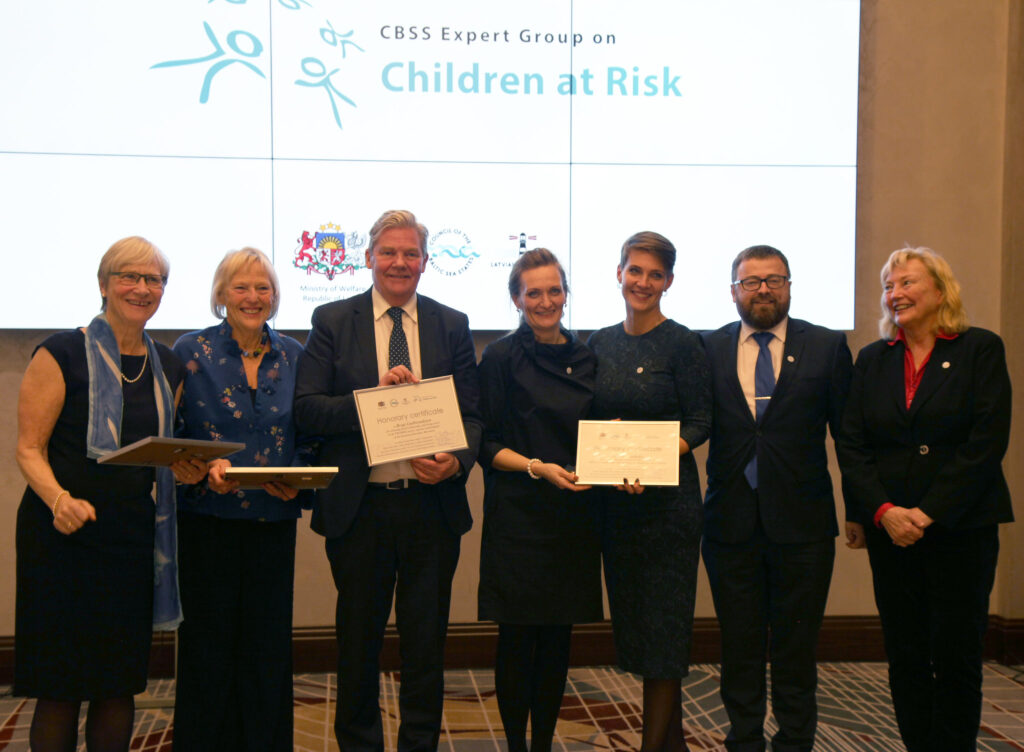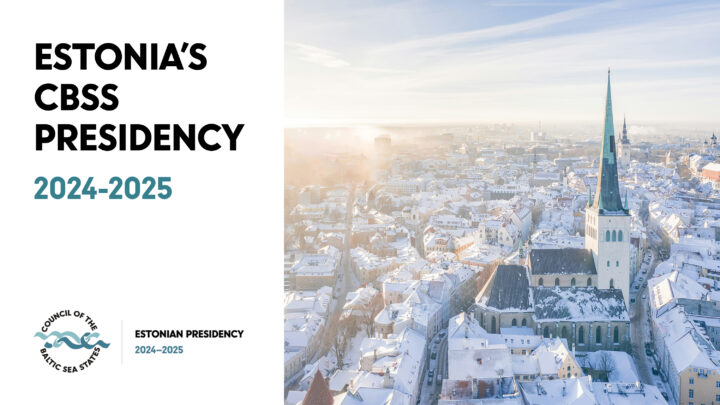By political decision in 1998, the Council of the Baltic Sea States (CBSS) initiated regional cooperation activities implementing the UN Convention on the Rights of the Child. With the CBSS Expert Group on Children at Risk as the hub of cooperation, the region has not only developed models and guidelines to support children at risk of violence, exploitation and trafficking but also established the European Barnahus movement and supported interagency and multi-disciplinary interventions for child victims of violence across Europe.
On 6 December 2018, the Expert Group and stakeholders celebrated in Riga – the birthplace of the Group – the achievements of the last 20 years, honouring the founding members and the Expert Group’s work done on national, regional and international level in the field of children’s rights.
The celebration was initiated with a reception and a lunch on the 6 of December organised by the Latvian Presidency and Ministry of Foreign Affairs. The work of the Expert Group was highlighted in the presence of the Senior Officials and invited guests.
In the evening, a dinner was organised by the Ministry of Welfare in a restaurant in Riga, honouring some key persons and their role in initiating the cooperation and ensuring its success. A journalist at Radio Latvia and TV24 Ansis Bogustovs assisted in the moderation of the event.
The dinner celebrated and spread awareness about the positive achievement of the CBSS Expert Group on Children at Risk.

The State Secretary of the Ministry of Welfare of Latvia, Ingus Alliks presented honorary certificates to individuals who were influential in the early days of the Expert Group.
- Ingrid Åkerman and Agneta Björklund for initiating regional cooperation on children at risk, who presented information about the origin of the cooperation.
- Bragi Gudbrandsson for initiating the first Barnahus and being active in the PROMISE project. In addition, Bragi has been part of establishing the Expert Group and had been the Icelandic representative for almost 20 years.
- Centre Dardedze represented by Liena Krūmiņa and Agnese Sladzevska for being a regional example on how to promote child participation and NGO advocacy on children at risk in general. Agnese presented how the CBSS cooperation and the launch of Centre Dardedze was mutually beneficial and continues to be as we work together on Barnahus, Non-violent Childhoods programme and other initiatives.
The Head of the Children at Risk Unit at the Secretariat of the Council of the Baltic Sea States Turid Heiberg, presented broaches crafted by jewellers Inita and Vitauts Straupes at Baltu Rotas as honorary tokens. The broaches of the sun – a motif from ancient Prussian 2th-4th century, are a symbol of light, everlasting movement, returning, solidarity and entirety.
The State Secretary of the Ministry of Welfare of Latvia, Ingus Alliks expressed special gratitude to the Head of the Children at Risk Unit of the Secretariat of the Council of the Baltic Sea States Turid Heiberg for her management of the work on children at risk at the secretariat and support to the Council of the Baltic Sea States Expert Group on Children at Risk. For her work, she was presented a pin/an amulet “the bird of luck” crafted by jewellers Inita and Vitauts Straupes at Baltu Rotas. It is believed that the Lucky Bird connects Earth with Heaven, the masculine with feminine, and the ever-present with the changing.
Expert Group Members gave spontaneous gratitude and messages about the value of the group and the achievements, as well as the work that is still to be done. A collection of messages from all the member countries was circulated and presented on the screen, along with a short slideshow which sparked memories and stories.
Background
At the 1998 Summit in Riga, the Prime Ministers and Foreign Ministers supported CBSS initiated cooperation activities on children at risk, which firmly established the regional work and commitment to protecting children at risk under the auspices of CBSS. In 2002, the CBSS Senior Officials established the Expert Group as a formal group of the CBSS and the Children at Risk Unit as part of the Secretariat.
The CBSS Expert Group on Children at Risk has through its history addressed areas of common interest, including transnational issues relevant to all its Member States, by engaging ministries and national agencies, ombudsmen for children, academia, organisations, as well as children. A significant development in the fields of education, health and social welfare has taken place in each member state, and many children are relatively well informed and live in safety and security in their family setting.
However, too many children still experience different forms of violence and feel that they have few reliable adults to turn to. To fulfil the vision of the Baltic Sea Region as a violence-free zone for children, the Expert Group highlights key learnings from recent years as important for future work such as listening to the child; tailor-made support to the child and the family and taking children’s recommendations into account for the development of preventive strategies and interventions.
The Latvian Ministry of Welfare has been represented in this group since 2009 and before, the Ministry of Children and Family Affairs took part. The Ministry has throughout the years been actively working to enhance the level of support and protection for children in alternative care and also recently been a partner in the Non-violent Childhoods programme, which supports Latvia in strengthening initiatives against violence against children. The Latvian Ombudsman for Children, Juris Jansons, highlighted during a high-level conference on 15 November 2018 in Stockholm the importance to deal with any violations against children and to cooperate in this field: “We are all here to help children when there is no one who can help – we are here to educate societies and ourselves.”
